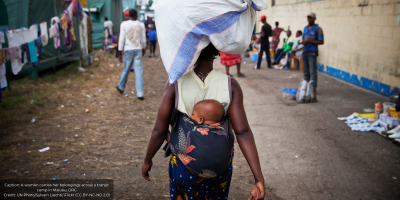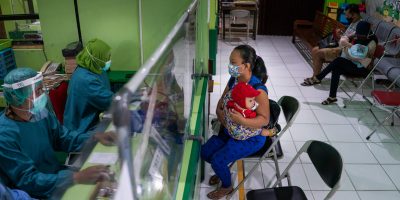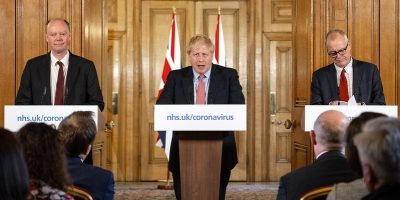Humanitarian assistance is framed around ‘protection’. Deciding whom to protect and against what is not straightforward, particularly during a pandemic. In Uganda, policies to protect against COVID-19 embraced containment through the reduction of movement and the securitisation of borders. Refugees in Uganda were described as particularly vulnerable to COVID-19 and therefore in need of protection, whilst simultaneously perceived to be a health security threat. This article critically explores containment and protection by focusing on refugee self-protection. Ethnographic research was carried out during COVID-19 in Palabek refugee settlement in northern Uganda, amongst refugees from South Sudan. In contrast to containment policies that curtailed mobility in order to ‘protect’, research findings demonstrate that self-protection included dynamic social boundaries around the settlement, and harnessed mobility. The latter drew on social, political, and historical borderland dynamics between (South) Sudan and Uganda. Effective social boundaries around Palabek were only created when policies of containment had legitimacy. Boundaries were circumvented when legitimacy waned and wider socio-economic challenges, particularly regarding food insecurity, came to the fore. If humanitarians and the Ugandan government had understood the essential need to consider self-protection, they might have paid more attention to ensuring the long-lasting legitimacy of COVID-19 containment policies amongst refugees.
Article
Protection and containment: surviving COVID-19 in Palabek refugee settlement, Northern Uganda
Regions
East and Southern AfricaRegional Hub
Central and East Africa HubRegional Hub Themes
Displacement and humanitarian protectionDOI: https://onlinelibrary.wiley.com/doi/10.1111/1758-5899.13496
See also
Research paper
‘When the World Turns Upside Down, Live Like a Bat!’ Idioms of Suffering, Coping, and Resilience among Elderly Female Zande Refugees in Kiryandongo Refugee Settlement, Uganda (2019-20)
This paper draws on ethnographic research with South Sudanese Zande refugees in Kiryandongo Refugee Settlement, Uganda, to show a different and often overlooked perspective; that of elderly refugee women. Having lived through decades of war and displacement, these women have…
Central and East Africa Hub
Taylor & Francis Online
2022
Briefing
Balancing epidemic preparedness and response with humanitarian protection in Ugandan refugee settlements
This brief presents considerations for preparedness and response, focusing on refugee settlements in north Uganda and drawing on ethnographic data collected during COVID-19.
Central and East Africa Hub
SSHAP
2024
Research paper
Cash, COVID-19 and aid cuts: a mixed-method impact evaluation among South Sudanese refugees registered in Kiryandongo settlement, Uganda
In this paper, we estimate the impact after 4–8 months of a large one-off unconditional cash transfer delivered to refugees in Kiryandongo settlement, Uganda during a time of dual shocks: the COVID-19 pandemic and cuts to monthly aid. We focus on…
Central and East Africa Hub
BMJ Publishing Group
2022
Briefing
Cross-Border Dynamics Between Uganda and South Sudan in the Context of the Outbreak of Ebola, 2022
This Key Considerations brief looks at cross-border dynamics between South Sudan and Uganda in the context of the 2022 outbreak of Ebola in Uganda, and the risk of the spread of the virus into South Sudan.
Central and East Africa Hub
SSHAP
2022
Briefing
Food assistance prioritisation in refugee settlements in Uganda and its impacts
This brief considers the humanitarian and policy implications of the general food and cash assistance prioritisation strategy in Uganda’s refugee settlements.
Central and East Africa Hub
SSHAP
2024
Report
Mobile Livelihoods: Borderland dynamics between Uganda and South Sudan
This report from the Rift Valley Institute explores the dynamics of transnational movement and networks of kin of South Sudanese and South Sudanese refugees in Uganda.
Central and East Africa Hub
Rift Valley Institute
2022
Research paper
Protection and well-being of adolescent refugees in the context of a humanitarian crisis: Perceptions from South Sudanese refugees in Uganda
Improved understanding of refugees’ perceptions of provision of humanitarian support is important to improve design and delivery of humanitarian assistance. Refugee adolescents face a range of adversities, while the phase of displacement likely influences risk factors for adolescent refugees. However,…
Science Direct
2019
Blog
What it means to be a ‘refugee’ in South Sudan and Uganda
After decades of armed conflict in South Sudan and Uganda, labels of ‘refugee’ and ‘internally displaced person’ fail to reflect the complex realities of the people they refer to. This blog post examines the history of movement across the region’s…
Central and East Africa Hub
London School of Economics
2019
Related content

blog
In this blog, Central and East Africa Regional Hub partners, Grace Akello, Leben Moro and Godefroid Muzalia share their perspectives on what regional collaboration looks like, from the Ebola response to bridging connections between South-South and North-South Collaborations.
Central and East Africa Hub
Grace Akello, Leben Moro, Godefroid Muzalia
29 Mar 2023




